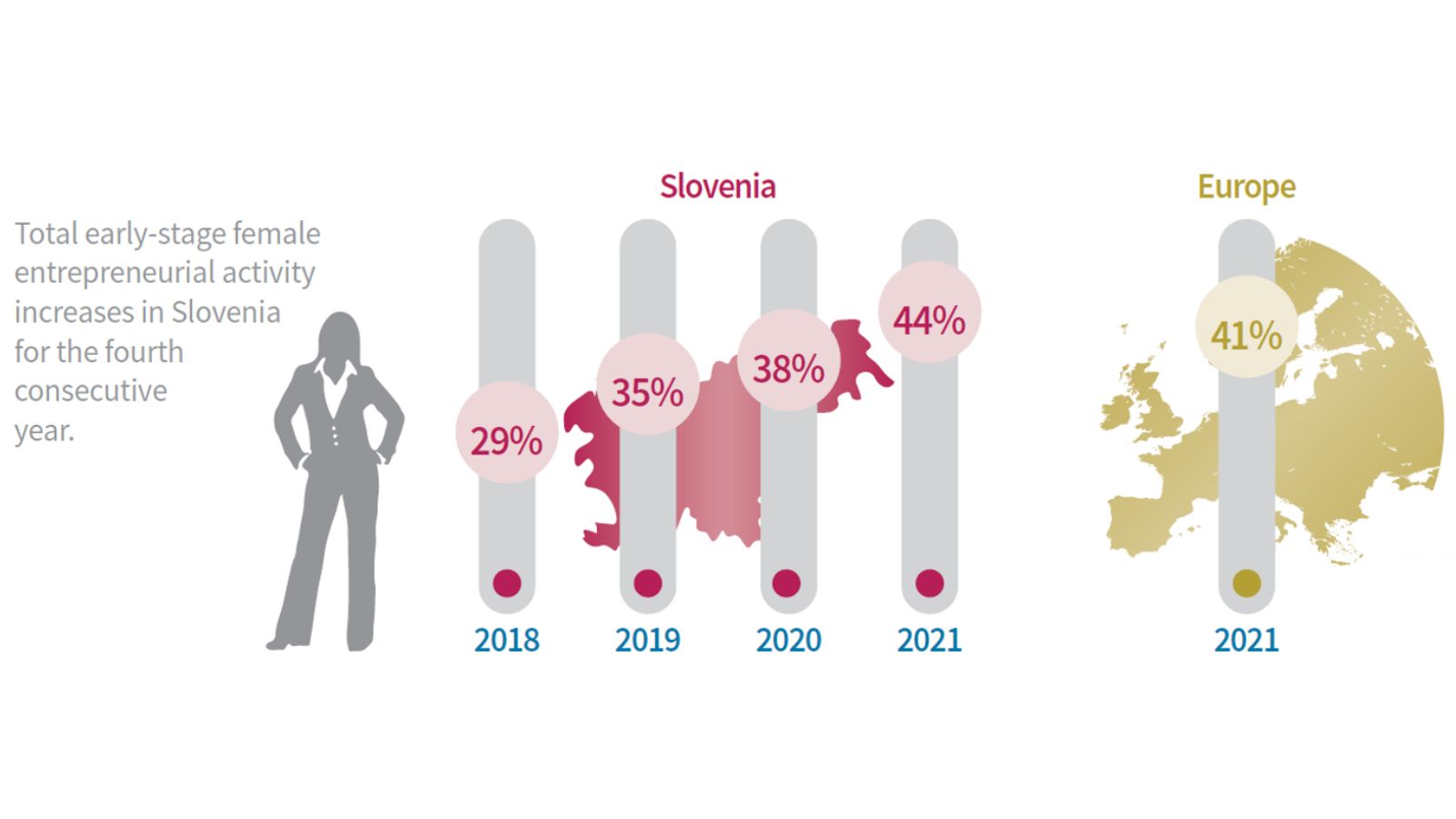By Aileen Ionescu-Somers
Global Entrepreneurship Monitor scans the “radar screen” of how national and even regional or city entrepreneurship business contexts are evolving in today’s highly competitive world. As a result, GEM is a source of diagnostic tools for policymakers and other stakeholders to guide decision-making and activities that enable entrepreneurs to flourish, grow robust and value-adding businesses, and to evaluate the impact of any decision or policy.
We heard several applications of this in our GEM webinar held on 24 August, featuring 2021 “gold nugget” research findings from our National Teams in Slovenia, Egypt and Colombia (you can access the recording at this link).
Women’s Entrepreneurship in Slovenia
Policies aimed at encouraging female entrepreneurship in Slovenia are working, according to Karin Širec, GEM Slovenia Team Leader and Head of the Department for Entrepreneurship and Business Economics at the University of Maribor. As detailed in the country’s latest National Report, in 2021, total early-stage female entrepreneurial activity increased in Slovenia for the fourth consecutive year. By comparison, in 2021 the European average for total early-stage female entrepreneurship was 41%.

There was a notable shift in the motivations of Slovenian entrepreneurs in comparison to other countries, when it comes to perceived organisational purpose. We learned that 61.8% of the country’s entrepreneurs who took part in the GEM Adult Population Survey were motivated to start businesses “to make a difference in the world.” This is significantly higher than the European average of 41.2%.
Supporting Egyptians Who Intend to Start a Business
As well as providing diagnostics, GEM is a valuable source of comparative data. For example, in comparison to Slovenia, a very different reality for women entrepreneurs reigns in Egypt. There, only 24% of businesses started in Egypt are owned by women, which means that there is significant opportunity to promote women’s entrepreneurship in that country. Just 15% of established businesses in the country are led by women and even for those, the discontinuity rate is higher than the global average.
“This is an area that we are pushing to address on the policy side,” said Ayman Ismail, GEM Egypt Team Leader and a professor at the American University in Cairo School of Business. “There has been some improvement in ecosystem metrics over the last five years, but these numbers are still lower than the global average.”
According to Ismal, another key area to address is entrepreneurial intention, that is, the aspirations of entrepreneurs to create businesses. The latest National Report in Egypt noted that 57% of respondents to the GEM survey have aspired to create a business in the next three years. However, the TEA rates continually hovers around the 10% mark.
“This conversion is low,” said Ismal. “Why are people aspiring to start a business not doing so? The answer is rooted in the lack of an enabling business environment and thus, improvement of the regulating policies is required.”
In Egypt, there has been a strong positive recovery following the initial shocks to the economy after the initial phase of the COVID-19 pandemic. However, more than 80% of respondents indicated that their income had declined. Moreover, more than 45% knew an entrepreneur personally who had ceased business operations and 58% of Egyptian business owners surveyed confirmed that they had to downsize. However, there was a marked improvement in 2021.
Identifying Policy Improvements and Opportunities in Colombia
Interestingly, and contrary to Egypt, there was an increase in entrepreneurial activity in Colombia in 2020, but conversely, those numbers decreased in 2021. Fernando Pereira, GEM Colombia Team Leader and a professor at the Pontificia Universidad Javeriana Cali Business School, shared that the reason for this was that many people lost their jobs in 2020 and resorted to entrepreneurship. Once the economy opened up in 2021, a percentage of these individuals who had pursued entrepreneurship the previous year simply returned to their former jobs.
Pereira was also able to share data and insights on the impact of a governamental strategy that came into effect in 2020 as a State National Policy, Law 2069 called Política Nacional de Emprendimiento. On the positive side, the GEM National Expert Survey (NES) revealed that government policies are above both the global and regional average in terms of providing an enabling environment for entrepreneurs. This new strategy is also promoting inclusion and diversity by supporting minority groups, such as rural women entrepreneurs.
Entrepreneurs surveyed in Colombia noted that taxes remained a significant burden. In this respect, Colombia fared lower than global and regional peers. Also, there has been a steady decrease over the years in the Established Business Owner rate (those owning a business for more than 42 months).
“GEM is a terrific tool for policymakers since it provides guidance in addressing national policies,” explained Pereira. “The data shows an increase in new entrepreneurs, but highlights the fact that much work needs to be done to support the important population of established entrepreneurs, preventing closure.”
Final Thoughts
We invite you to continue learning with us the latest trends happening in entrepreneurship around the world. Our next National Report webinar series features Ireland, Chile and South Africa and takes place on 20 September. You can register at this link.
Also, GEM is increasingly interested in partnering with other organisations to explore the relationship between innovation and entrepreneurship more deeply, using the data in combination with data from other sources to produce results that give new and deeper perspectives. If that might be of interest to you, please reach out to info@gemconsortium.org.
Aileen Ionescu-Somers is Executive Director of Global Entrepreneurship Monitor.

